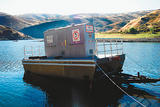
Sometimes, you've just gotta go. But, it can be tricky when you're out in the middle of the water.
State officials want to make it easier for water lovers to find relief by building a floating restroom.
The buoyed bathroom would be like a barge away from shore, said Anne Smith, a consultant with the Virginia Department of Health's Marina Program. At least two bathrooms, one for males and one for females, would be bolted on.
Folks on larger boats already have restrooms, or heads, she said. The floating restroom would be used by operators of small boats, by riders of personal watercraft such as Jet Skis or in areas where people go tubing, Smith said.
"They could just park and get in."
Connie Barbour, a long time fisherman and an owner of Long Bay Pointe Bait and Tackle in Virginia Beach said he doubts that people would do that.
He said he has seen people who had emergencies on small boats, and they usually go i n a bucket. "Unfortunately, more than likely, they dump it over," he said.
That's what state marine workers are trying to stop folks from doing.
Virginia received a $928,125 grant from the U.S. Fish and Wildlife Service to provide boaters with more sewage pump-out facilities as part of the Clean Vessel Act. The grant was part of $12.26 million given to 32 states. In Virginia, part of that money has been earmarked to install 28 sewage pump-out stations and a pump-out boat at various locations.
P O L L
Would you use an offshore floating bathroom?
Yes
No
Undecided
View results
See Thing Your Way.
Latest Videos
iSHOOT: Blue Angels flying high in the sky
Watch HamptonRoads.tv on TV Sunday night!
Pilot dies in crash at Ocean Air Show rehearsal
SK8R Bash draws youth to Mount Trashmore
Air Guitar World Championships
Hundreds Attend Dannielynn's Birthday Party
Nevada Governor Speaks Out on Fossett Search
See the complete Pilot, exactly as in print
- View stories, photos and ads
- E-mail clippings
- Print copies
Log in or learn more
Boats with heads would pull up and connect a hose between their vessel and the pump-out facility. Waste water then would be transferred from the boat into a holding area, where it would be treated, pretty much the same as waste is treated from residences. There are about 300 of the stations statewide, Smith said.
Improper waste disposal hurts everyone, Smith said. The Virginia Department of Environmental Quality released a report Tuesday saying some state waterways are polluted with fecal bacteria, which can come from solid human or pet waste.
"It could lead to beach closings, contamination of shellfish beds, and it can be harmful to aquatic plants and marine life," Smith said.
Marinas and municipalities interested in obtaining pump-out stations or upgrading existing ones would pay 25 percent of the cost for the new facilities. The rest would be covered by the grant.
A typical pump-out station could cost about $15,000 total, she said. A floating restroom could cost from $40,000 to $80,000.
The state Health Department is working to find a municipality-possibly off the shores of Hampton Roads or Smith Mountain Lake in southwestern Virginia-to foot 25 percent of the bill for the floating restroom.
Keeping the water clean is a priority, Long Bay Pointe's Barbour said, though he's not sold on the floating commodes. Many smaller vessels have portable toilets, he said, and parks and marinas provide toilets.
In a hurricane, someone would have to pull the floating facility to shore, he said.
"That would be the last thing you'd want flipped over," he said.
And, Barbour said, "you'd be surprised how many people would get seasick trying to get in one of those places.
"The money would be better spent on educating people about not using the water for those purposes."
Smith said there are education programs to teach boaters how to dispose of waste a nd that her department knows that rougher waters could make it difficult to maintain one's sea legs while taking care of business on a bobbing bathroom.
"We would try and locate it somewhere that didn't have a lot of current and wave action to try and minimize that," she said.

No comments:
Post a Comment